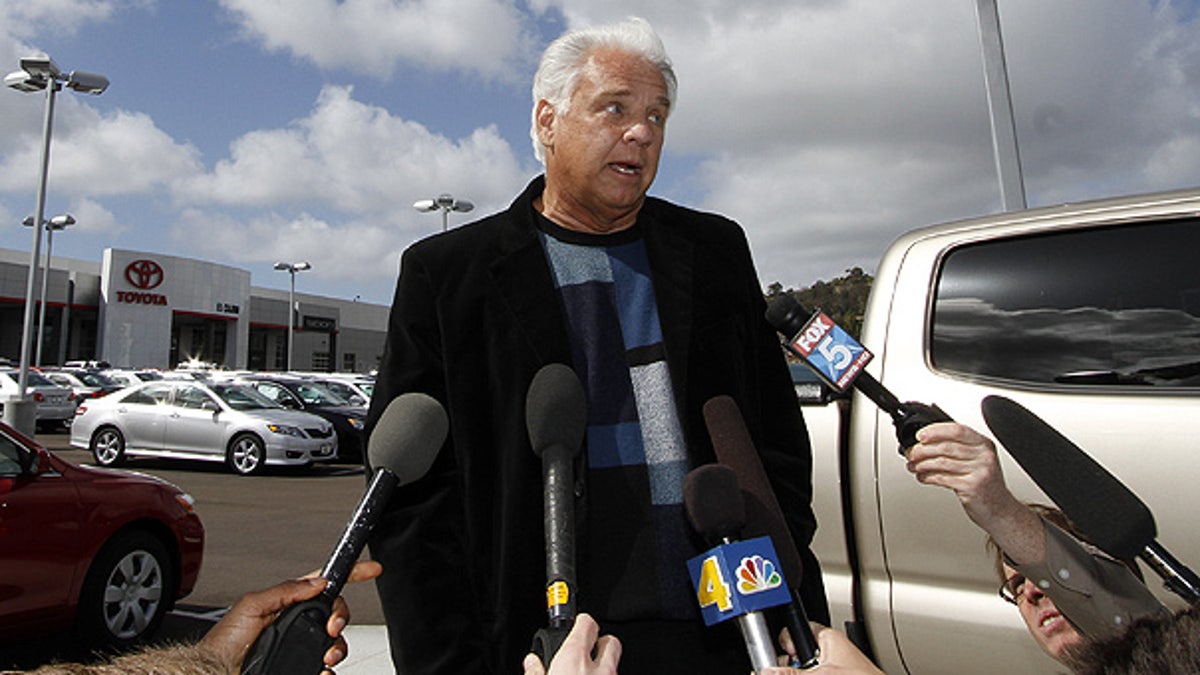
Mar. 9: Driver James Sikes talks about his experiences in his Toyota Prius during a news conference held at Toyota of El Cajon, Calif. (AP)
Toyota is casting doubt on a California man's claim that his Prius sped out of control on a California freeway, saying Monday that it found "significant inconsistencies" between the the man's story and the company's preliminary findings.
The car's accelerator pedal was tested and found to be working normally, and a backup safety system also worked properly, Toyota spokesman Mike Michaels said during a news conference.
"Toyota believes there are significant inconsistences," Michaels said. "To say this incident was sensationalized would be an enormous understatement."
The driver, James Sikes, called 911 on March 8 to report that his 2008 Toyota Prius suddenly accelerated to 94 mph on a freeway near San Diego. The incident ended when Sikes stopped the car with help from a California Highway Patrol officer.
Toyota said Monday that its preliminary investigation into the alleged malfunction showed that the shift lever worked normally and neutral could be selected. Michaels said the neutral position is clearly marked and can be easily engaged by moving the lever left to the "N" marking.
He also said there were no diagnostic trouble codes found in the power management computer, nor was the dashboard malfunction indicator light activated. The hybrid self-diagnostic system, however, showed evidence of numerous, rapidly repeated on-and-off applications of both the accelerator and the brake pedals.
The automaker added that the front brakes showed severe wear and damage from overheating but the rear brakes and parking brake were in good condition.
John Gomez, an attorney for Sikes, said over the weekend that it's insignificant and not surprising that investigators could not replicate the incident.
"They have never been able to replicate an incident of sudden acceleration. Mr. Sikes never had a problem in the three years he owned this vehicle," he said Sunday.
"This problem is sort of a ghost in the machine that is the Toyota system," Gomez said. "It doesn't leave a fault code, it doesn't leave a footprint and you can't make it happen upon demand."
But Kurt Bardella, a spokesman for U.S. Rep. Darrell Issa, R-Calif., said the failure to duplicate the stuck accelerator, along with a vehicle design to prevent such occurrences, raises questions about the driver's story.
"We're not saying Mr. Sikes is wrong or that he lied, we're saying that questions have arisen in the investigation," Bardella said.
The National Highway Traffic Safety Administration is looking into claims from more than 60 Toyota owners that their vehicles continue to accelerate unexpectedly despite having their vehicles repaired.
Technicians with the NHTSA and Toyota could not duplicate what Sikes said he experienced March 8 on a mountainous but lightly traveled stretch of Interstate 8 east of San Diego, according to a congressional staffer's memo prepared for the House Committee on Oversight and Government Reform.
"Every time the technician placed the gas pedal to the floor and the brake pedal to the floor the engine shut off and the car immediately started to slow down," the memo read.
According to the memo, a Toyota official who was at the two-day inspection last week in suburban San Diego explained that an electric motor would "completely seize" if a system to shut off the gas when the brake is pressed fails, and there was no evidence to support that happened.
"In this case, knowing that we are able to push the car around the shop, it does not appear to be feasibly possible, both electronically and mechanically that his gas pedal was stuck to the floor and he was slamming on the brake at the same time," according to the memo.
Toyota has recalled millions of cars because of floor mats that can snag gas pedals or accelerators that can sometimes stick. Sikes' car was covered by the floor mat recall but not the one for sticky accelerators. He later told reporters that he tried to pull on the gas pedal during his harrowing ride, but it didn't "move at all."
The Prius is powered by two electric motor-generators and a small gasoline engine, all connected by transmission gears. A computer, which Toyota calls the "hybrid control computer" determines what combination of motors is needed and which would be most efficient.
Craig Hoff, a professor of mechanical engineering at Kettering University in Flint, Mich., said that for the Prius to accelerate out of control, at least two systems would have to fail simultaneously. They are the sensor signal that tracks the brake and gas pedal positions when the driver presses on them and the hybrid control computers.
"The chance of them both going wrong, plus the fact that the signal is bad, it just seems very, very, very remote," Hoff said. "Could it happen? Statistically, yes. But it just doesn't seem very likely."
Several events usually combine to cause problems with cars, and it's difficult to reproduce them, Hoff said.
"It's going to make it really hard to find, because you've got to line up the multiple effects," he said.
The congressional memo said both the front and rear brakes were worn and damaged by heat, consistent with Sikes saying that he stood on the brake pedal with both feet and was unable to stop the car. But if the fail-safe system worked properly, the brakes wouldn't have been damaged because power would have been cut to the wheels.
Gomez said the best evidence that his client was frantically slamming the brakes is that a California Highway Patrol officer who was giving Sikes instructions over a loudspeaker smelled burning brakes and saw the lights on.